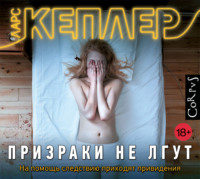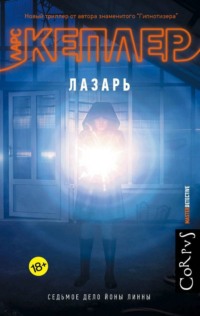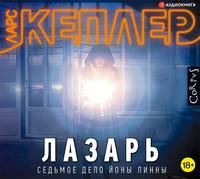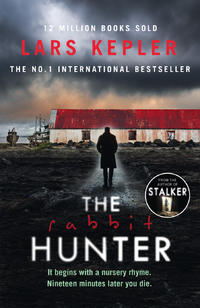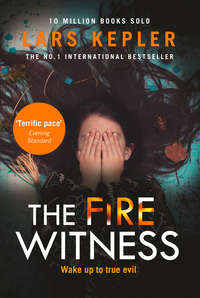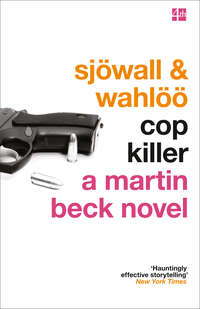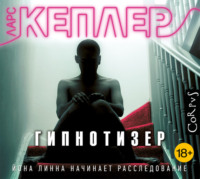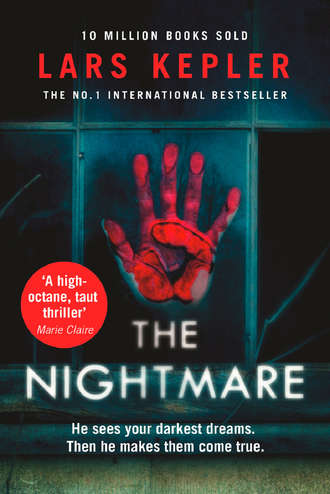
Полная версия
The Nightmare
You did something here, removed fingerprints, erased a hard disk, erased a message on an answer-machine, or collected something, Joona thinks.
That was what you were planning, anyway, but perhaps you got interrupted when I arrived.
Perhaps you were planning to use the fire to get rid of the evidence?
It’s a possibility.
Joona thinks that he could have done with Erixon right now. He can’t conduct a crime scene investigation without a forensics expert, he doesn’t have the right equipment. And he could ruin evidence if he were to search the flat on his own, possibly contaminate DNA and miss invisible clues.
Joona goes over to the window and looks down at the street, and the empty tables outside a café.
He realises he’s going to have to go to Police Headquarters and talk to his boss, Carlos Eliasson, and ask to be put in charge of the preliminary investigation: that’s the only way to get access to another forensics expert, the only way to get any help while Erixon is off work injured.
Joona’s phone rings just as he makes up his mind to follow the correct procedures and go and talk to Carlos and Jens Svanehjälm, and put together a small investigative team.
‘Hi, Anja,’ he says.
‘I’d like to have a sauna with you.’
‘A sauna?’
‘Yes, can’t the two of us have a sauna together? You could show me what a proper Finnish sauna is like.’
‘Anja,’ he says slowly. ‘I’ve lived almost my whole life here in Stockholm.’
He goes out into the hallway, then carries on towards the front door.
‘You’re a Swedish Finn, I know,’ Anja goes on. ‘Could there be anything more boring? Why can’t you be from El Salvador? Have you read any of Penelope Fernandez’s articles? You should see her – the other day when she went on the attack against Swedish arms exports on television.’
Joona can hear Anja’s breathing down the phone as he leaves Penelope Fernandez’s flat. He sees the paramedics’ bloody footprints on the stairs and feels his scalp prickle when he thinks of his colleague sitting in the stairwell with his legs wide apart, his face getting paler and paler.
Joona thinks again about the fact that the fixer thought he had killed Penelope Fernandez. That part of his job was done. The second part involved him breaking into her apartment, for some reason. If she’s still alive, finding her has to be a priority, because it won’t be long before the fixer realises his mistake and takes up the chase again.
‘Björn and Penelope don’t live together,’ Anja says.
‘Yes, I’ve worked that out,’ he replies.
‘People can still love each other – just like you and me.’
‘Yes.’
Joona emerges into the strong sunshine. The air is heavy and even more close than it had been earlier.
‘Can you give me Björn’s address?’
Anja’s fingers fly over the key of her computer with tiny clicking sounds.
‘Almskog, Pontonjärgatan 47, second floor …’
‘I’ll head over there before …’
‘Hang on,’ Anja says abruptly. ‘Not possible … Listen to this, I’ve just double-checked the address … There was a fire in the building on Friday.’
‘And Björn’s flat?’
‘That entire floor was destroyed,’ she replies.
19
An undulating landscape of ash
Detective Superintendent Joona Linna goes up the steps, stops, and stands absolutely still as he gazes into a black room. The floor, walls and ceiling are badly burned. The smell is still strongly acrid. There’s practically nothing left of those internal walls that aren’t load-bearing. Black stalactites hang from the ceiling. Charred stumps of posts rise up from an undulating landscape of ash. In places you can see right through between the beams to the rooms below. It’s no longer possible to tell which parts of that floor of the building belonged to Björn’s flat.
Grey plastic has been hung over the empty windows, blocking off the summer’s day and a green building on the other side of the street.
The only reason no one was injured in the fire at Pontonjärgatan 47 was that most people were at work when it broke out.
At five minutes past eleven o’clock the first call was received by the emergency control centre, but even though Kungsholmen fire station is very close to the building, the fire spread so rapidly that four flats were completely destroyed.
Joona thinks about his conversation with fire investigator Hassan Sükür. He used the second-highest level on the National Forensic Laboratory’s scale when he explained that their findings indicated that the fire had started in the home of Björn Almskog’s eighty-year-old neighbour Lisbet Wirén. She had gone down to the corner shop to exchange a small win on a lottery scratchcard for two new cards, and couldn’t remember if she’d left the iron on. The fire had spread rapidly, and all the indications were that it had started in her living room where the remains of an iron and ironing-board were found.
Joona looks round at the charred remains of the apartments on that floor. All that remains of the furniture are a few twisted metal shapes, part of a fridge, a bedstead and a sooty bath.
Joona goes back downstairs. The walls and ceiling of the stairwell have been damaged by smoke. He stops at the police cordon, turns round and looks up towards the blackness again.
As he bends down to pass under the cordon tape he sees that the fire investigators had dropped a few zip-lock bags on the ground – bags used to secure fluids. Joona walks through the green marble hall and out onto the street. He starts to walk towards Police Headquarters as he takes his phone out and calls Hassan Sükür again. Hassan answers at once and lowers the volume of a radio in the background.
‘Have you found any traces of flammable liquids?’ Joona asks. ‘You dropped some zip-lock bags in the stairwell, and I was wondering …’
‘Look, if someone uses any sort of flammable liquid to start a fire, then obviously that burns first …’
‘I know, but …’
‘But I … I usually manage to find evidence anyway,’ he goes on. ‘Because often it runs between cracks in the floorboards, ends up in the insulation or in the cavity between floors.’
‘But not this time?’ Joona asks as he walks down Hantverkargatan.
‘Nothing,’ Hassan says.
‘But if someone knew where traces of flammable liquids often get found, it would be possible to avoid detection.’
‘Of course … I’d never make a mistake like that if I was a pyromaniac,’ Hassan replies brightly.
‘But you’re convinced that the iron was the cause of this particular fire?’
‘Yes, it was an accident.’
‘So you’ve dropped the investigation?’ Joona asks.
20
The house
Penelope feels terror seize hold of her again. It’s as if it had only paused for breath before continuing to scream inside her. She wipes the tears from her cheeks and tries to stand up. Cold sweat runs down between her breasts, and down her sides from her armpits. Her body aches and trembles from the effort. Blood seeps through the dirt on her hands.
‘We can’t stay here,’ she whispers, pulling Björn after her.
It’s dark in the forest, but night is slowly turning to morning. Together they walk quickly down towards the shore again, but far to the south of the house where the party was.
As far away from their pursuer as they can get.
They’re still all too aware that they need help, that they have to get hold of a phone.
The forest opens up gradually towards the water, and they start running again. Between the trees they see another house, perhaps half a kilometre away, maybe less. They can hear a helicopter rumbling somewhere in the distance, moving away.
Björn seems dazed, and whenever she sees him lean on the ground or against a tree she starts to worry that he won’t be able to run any more.
A branch creaks somewhere behind them, as if snapped by someone standing on it.
Penelope starts to run through the forest as fast as she can. She can hear Björn breathing heavily behind her.
The trees begin to thin out and she can see the house again, just a hundred metres away. The lights in the window are reflecting off the red paint of a Ford parked outside.
A hare darts off across the moss and undergrowth.
Panting and wary, they emerge onto the gravel drive.
Their calves are stinging with exertion as they stop and look round. They walk up the front steps, open the door to the porch and go in.
‘Hello? We need help!’ Penelope calls.
The house is warm inside from the sun. Björn is limping, and his bare feet leave bloody prints on the hall floor.
Penelope hurries through the rooms, but the house is empty. The inhabitants probably slept over at their neighbours’ after the party, she thinks, and stands at the window and looks out, hidden behind the curtain. She waits for a while, but can’t detect any movement in the forest or on the lawn or drive. Maybe their pursuer has finally lost track of them, maybe he’s still waiting at the other house. She goes back to the hall, where Björn is sitting on the floor looking at the wounds on his feet.
‘We need to find you a pair of shoes,’ she says.
He looks up at her with a blank expression, as though he doesn’t speak the language.
‘This isn’t over yet,’ she says. ‘You need to put something on your feet.’
Björn starts to hunt through the hall cupboard, pulling out flip-flops, wellington boots and old bags.
Avoiding all the windows, Penelope hunts as quickly as she can for a phone, checking the hall table, the briefcase on the sofa, the bowl on the coffee table, and among the keys and paperwork on the kitchen counter.
There’s a sound outside and she stops to listen.
Perhaps it was nothing.
The first of the morning sun is shining in through the windows.
Crouching, she hurries into the main bedroom and pulls out the drawers in an old chest. She finds a framed family photograph lying among the underwear. A portrait taken in a studio, a husband and wife and two teenage daughters. The other drawers are empty. Penelope opens the wardrobe, pulls the few items of clothing from their metal hangers, and takes a knitted jumper and a hooded jacket that looks like it would suit a fifteen-year-old.
She hears a tap running in the kitchen and hurries in there. Björn is leaning over the sink drinking from the tap. He’s wearing a pair of old trainers on his feet, a couple of sizes too big.
We have to find someone who can help us, she thinks. This is getting ridiculous, there must be people everywhere.
Penelope goes over to Björn and hands him the knitted jumper. Suddenly there’s a knock at the door. Björn smiles in surprise, pulls the sweater on and mutters about them finally having a bit of luck. Penelope walks towards the hall, brushing her hair from her face. She’s almost there when she sees the silhouette through the frosted glass.
She stops abruptly and looks at the shadow through the glass. Suddenly she can’t bring herself to reach out her hand and open the door. She recognises his posture, the shape of his head and shoulders.
The air feels like it’s running out.
Slowly she backs away into the kitchen. Her body is twitching, she wants to run, her whole body wants to run. She stares at the glass window, at the indistinct face, the narrow chin. She feels dizzy as she moves backwards, trampling on bags and boots, reaching out to the wall for support, running her fingers across the wallpaper, knocking the hall mirror askew.
Björn stops beside her, he’s clutching a broad-bladed kitchen knife in his hand. His cheeks are white, his mouth half open, his eyes staring at the window in the door.
Penelope backs into a table as she sees the door-handle slowly being pushed down. Quickly she goes into the bathroom and turns the taps on, then calls out in a loud voice:
‘Come in! The door’s open!’ Björn starts, his pulse is thudding in his head, he’s holding the knife in front of him, ready to defend himself, to attack, as he sees their pursuer slowly let go of the door-handle. The silhouette disappears from the window, and a few seconds later he hears footsteps on the gravel path beside the house. Björn glances to his right. Penelope comes out of the bathroom. He points to the window in the television room and they move away into the kitchen as they hear the man walk across the wooden terrace. Penelope tries to figure out what their pursuer can see, wondering if the angles and light will reveal the shoes scattered across the hall, Björn’s bloody footprints on the floor. The wooden terrace creaks again. He’s making his way round the house, towards the kitchen window. Björn and Penelope huddle up on the floor, pressing against the wall beneath the window. They try to lie still and breathe quietly. They hear him reach the window, his hands slide across the sill and they realise he’s looking into the kitchen.
Penelope notices that the glass door of the oven reflects the window, and in the reflection she sees their pursuer looking around the room. It occurs to her that he’d be looking her right in the eye if he happened to look at the oven door. It won’t be long before he realises that they’re hiding in there.
The face in the window disappears, they hear footsteps across the terrace again, then along the gravel path leading to the front of the house. When the front door opens Björn walks quickly over to the kitchen door, puts the knife down, turns the key that’s sitting in the lock, pushes the door open and rushes out.
Penelope follows him, out into the coolness of the garden. They run across the grass, past the compost heap and into the forest. It’s still fairly dark, but the first light of dawn is pressing between the trees. Penelope’s fear is chasing her, driving her on, churning up the panic in her chest again. She dodges thick branches, jumps over low bushes and rocks. Just behind her she can hear Björn, breathing hard. And behind him she can sense the other man the whole time, the man who feels like a shadow. He’s following them, and she knows he’s going to kill them when he finds them. She remembers something she once read somewhere. There was a woman in Rwanda who survived the Hutus’ genocide of the Tutsis by hiding in the marshes and running every day, running for all the months the genocide lasted. Her former neighbours and friends came after her with machetes. We imitated the antelope, the woman explained in the book. Those of us who survived in the jungle imitated the antelope’s flight from its predators. We ran, we chose unexpected paths, we split up and changed direction to confuse our pursuers.
Penelope knows that the way that she and Björn are running is completely wrong. They have no plan, no ideas, and that’s only going to benefit the man chasing them. There’s no guile to the way they’re running. They want to go home, they want to find help, they want to call the police. And their pursuer knows all this, he understands that they’re going to try to find people who can help them, that they’re going to try to find inhabited areas, heading towards the mainland and home.
Penelope tears a hole in her jogging bottoms on a fallen branch. She staggers a few steps but keeps going, only noting the pain as a burning snare round her leg.
They mustn’t stop. She can taste blood in her mouth. Björn stumbles through a thicket, they change direction at a fallen tree with a pool of water in the hole left by its roots.
As she runs alongside Björn, her fear suddenly brings to mind an unexpected memory, a memory of a time when she was just as frightened as she is now. It was when she was in Darfur. There was something about people’s eyes there, a difference in the eyes of those who had been traumatised, who couldn’t go on, and those who were still fighting, who refused to give up. She will never forget the children who came to Kubbum one night with a loaded revolver. She will never forget the fear she felt then.
21
The Security Police
The main offices of the Security Police are on the third floor of the main block at Police Headquarters, with its entrance on Polhemsgatan. The sound of a whistle can be heard from the exercise yard of the prison, which is situated at the top of the same building. The head of the department for security measures is called Verner Zandén. He is a tall man with a pointed nose, dark, jet-black eyes and a very deep voice. He’s sitting with his legs wide apart on the chair behind his desk, holding up a calming hand. Weak light is coming in through the little window facing the inner courtyard. The room smells of dust and hot light-bulbs. In this unusually drab room stands a young woman named Saga Bauer. She is a superintendent, and has specialised in counter-terrorism. Saga Bauer is only twenty-five years old, and has green, yellow and red ribbons threaded through her long, blonde hair. She looks like a wood-nymph, always in the middle of a beam of light in a forest glade. She is wearing a large-calibre pistol in a shoulder holster beneath an open hooded jacket with the logo of Narva Boxing Club on it.
‘I’ve led the operation for more than a year,’ she pleads. ‘I’ve done the surveillance, I’ve spent whole nights and weekends …’
‘But this is something different,’ her boss interrupts with a smile.
‘Please … You can’t just ignore me again.’
‘Ignore you? A forensics expert from National Crime has been seriously injured, a detective superintendent has been attacked, the apartment could have exploded, and …’
‘I know all that. I’m on my way there now …’
‘I’ve already sent Göran Stone.’
‘Göran Stone? I’ve worked here for three years, and I haven’t been allowed to finish a single case. This is my area of expertise. Göran doesn’t know anything about …’
‘He did well in the tunnels.’
Saga swallows hard before replying:
‘That was my case too, I found the link between …’
Verner says seriously:
‘But it got dangerous, and I still consider that I made the right decision.’
She blushes and looks down, composes herself and then says calmly:
‘I can do this. It’s what I’ve been trained to …’
‘Yes, but I’ve already made my decision.’
He rubs his nose, sighs, then puts his feet up on the waste-paper basket under the desk.
‘You know I’m not here because of some equal opportunities programme,’ Saga says slowly. ‘I’m not part of any quota, I came top of my group in all the tests, I was the best ever at sniper fire, I’ve investigated two hundred and ten different …’
‘I’m just worried about you,’ he says weakly, looking into her clear blue eyes.
‘I’m not a doll, I’m not some princess or fairy.’
‘But you’re so … so …’
Verner turns bright red and then he holds his hands up helplessly.
‘Okay, what the hell, you can be in charge of the preliminary investigation, but Göran Stone is part of the team, so he can keep an eye on you.’
‘Thanks,’ she says with a relieved smile.
‘This isn’t a game, remember that,’ he says in his deep voice. ‘Penelope Fernandez’s sister is dead, executed, and she herself is missing …’
‘And I’ve noticed an increase in activity among a number of extreme left-wing groups,’ Saga says. ‘We’re investigating whether the Revolutionary Front are behind the theft of explosives in Vaxholm.’
‘Obviously the most important thing is to find out if there’s any immediate threat,’ Verner explains.
‘Right now there’s a lot of radicalisation going on,’ she says, a little too keenly. ‘I’ve just been in touch with Dante Larsson at the Military Intelligence and Security Service, and he says they’re expecting acts of sabotage during the summer.’
‘But for the time being we’re concentrating on Penelope Fernandez,’ Verner smiles.
‘Of course,’ Saga says quickly. ‘Of course.’
‘The forensic examination is a collaboration with National Crime, but apart from that they’re to be kept out of it.’
Saga Bauer nods and waits a few moments before asking:
‘Am I going to be allowed to conclude this investigation? It’s very important to me, so that …’
‘As long as you’re still sitting in the saddle,’ he interrupts. ‘But we have no idea where this is going to end. We don’t even know where it starts.’
22
Incomprehensible
On Rekylgatan in Västerås there’s a very long, and very white, housing block. The people who live there have easy access to Lillhags School, the football pitch and tennis courts.
Out of door number 11 comes a young man carrying a motorcycle helmet in one hand. His name is Stefan Bergkvist, and he’s almost seventeen years old, he attends the technical college and lives with his mum and her partner.
He has long fair hair and a silver ring in his bottom lip, and he’s wearing a black T-shirt and baggy jeans whose cuffs have been trodden to pieces.
Without any hurry he walks down to the car park, hangs the helmet on the handlebars of his motocross bike and rides slowly down onto the path around the building, carries on beside the double railway track, under the Norrleden viaduct, into the big industrial estate and stops beside a wooden shack covered with blue and silver graffiti.
Stefan and his friends usually meet here to race on the motocross circuit they’ve made along the railway embankment, riding up and down the various tracks before returning to Terminalvägen.
They started coming here four years ago when they found the keys to the shack hidden on a nail at the back among the thistles. The building had stood untouched for almost ten years. For some reason it had been left behind after a large building project.
Stefan gets off his bike, unlocks the padlock, lowers the steel bar and opens the wooden door. He goes inside the shack, looks at the time on his phone, and sees that his mum’s called.
He doesn’t notice that he’s being watched by a man of about sixty wearing a grey suede jacket and light-brown shoes. The man is standing behind a skip by the low industrial building on the other side of the railway line.
Stefan goes over to the little kitchen corner, picks up the packet of crisps from the sink, tips the last few crumbs into his hand and eats them.
The light inside the shack comes from two dirty windows with bars across them.
Stefan waits for his friends, leafing through one of the old magazines that were left on top of the map cabinet, a copy of a soft porn magazine with the words ‘Imagine being licked and getting paid for it!’ on the front beside a young woman with bare breasts.
The man in the suede jacket calmly leaves his hiding place, passes the gantry holding the overhead power lines and crosses the brown embankment with its double tracks. He goes over to Stefan’s motorcycle, folds the support away and wheels it over to the door of the shack.
The man looks round, then leans the motorbike on the ground and pushes it with his foot so that it’s wedged tightly against the door. He opens the fuel tank and lets the petrol run out beneath the shack.
Stefan goes on looking through the old magazine, looking at faded photographs of women taken in a prison setting. One blonde woman is sitting in a cell with her legs wide apart, showing her genitals to a prison guard. Stefan stares at the picture, then jumps when he thinks he hears a rustling sound from outside. He listens, thinks he can hear footsteps and quickly closes the magazine.



